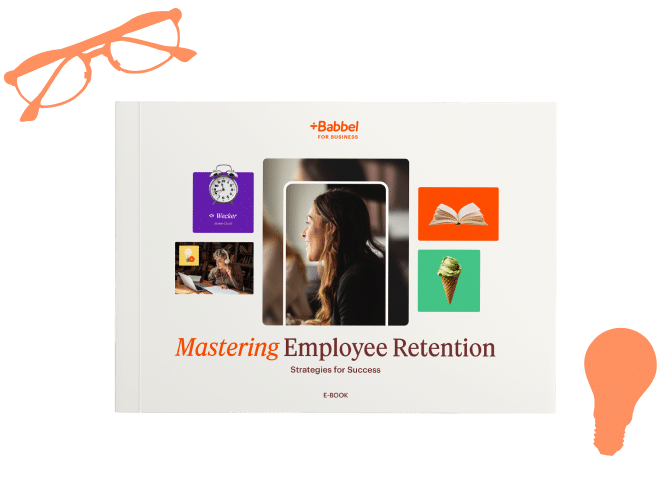The corporate world has experienced significant transformations in recent years. Our preferences regarding how and where we work have fundamentally evolved, along with the priorities, values, and expectations of employees.
Consequently, companies must be adaptable and innovative, ready to embrace change while meeting the needs of their workforce. In 2025, the emphasis will be on people, with employee experience (EX) taking center stage.
As we prepare for the new year, we’ve compiled the latest trends shaping HR in 2025. Discover how to adapt your HR strategies to effectively prepare for the future workplace.

Ready to enhance employee retention?
Explore proven strategies and insights to enhance employee retention and engagement in your organization through professional development, upskilling, and reskilling.
1. Artificial Intelligence Is Revolutionizing HR
Artificial Intelligence (AI) is no longer just a futuristic concept; it is fundamentally transforming HR practices. In 2025 and beyond, AI will continue to play a crucial role in reshaping HR processes.
A significant advantage of AI in HR is the automation of repetitive tasks, allowing HR teams to concentrate on more strategic responsibilities that require human creativity and empathy. For instance, AI-powered tools can optimize the recruitment process by analyzing vast amounts of applicant data and identifying the best candidates.
Moreover, AI is instrumental in creating personalized employee experiences. By analyzing employee data, tailored development paths can be designed that align with individual strengths and weaknesses, fostering engagement and enhancing retention.
AI also significantly impacts learning and development. AI-driven learning platforms offer customized training programs that adapt to employees’ progress and preferences.
While AI presents numerous benefits, it is essential to consider the ethical implications. Companies must ensure that their AI systems are transparent, fair, and respectful of employee privacy.
2. Sustainability and Social Responsibility in Focus
Sustainability and social responsibility will increasingly shape HR practices in 2025 and beyond. Companies will prioritize implementing sustainable practices and fulfilling their social responsibilities, not only to protect the environment but also to enhance their appeal as employers.
HR departments will create programs that engage employees in sustainable initiatives, enabling them to contribute actively to environmental improvements. This could involve promoting eco-friendly work practices or supporting community projects.
Furthermore, companies will scrutinize their supply chains to ensure they are ethical and sustainable, necessitating close collaboration between HR, procurement, and other departments.
Incorporating sustainability into corporate culture will not only strengthen employee retention but also enhance brand image and prepare the company for future challenges.
3. Employee Experience Takes Center Stage
Employee Experience (EX) is more than just a buzzword; it is a critical success factor for any company—and in today’s job market, it is more important than ever.
According to Gartner, EX was a priority for 47% of HR leaders in 2023, and for good reason. Employee experience influences retention, engagement, and performance, making it essential for attracting top talent. Companies aiming for success in the new world of work must ensure their EX is exceptional.
But what does Employee Experience entail, and what constitutes a good EX in 2025 and beyond?
EX refers to the holistic experience of employees within their company, encompassing all aspects of their interaction—from hiring and onboarding to daily work and career progression.
In their 2022 Employee Experience Guide, the career and life coaching professionals at BetterUp identify three key components for a positive employee experience:
- Inclusive leadership
- Employee well-being
- Opportunities for hybrid and remote work
Other important factors include:
- Company culture
- Psychological safety
- Effective employee development strategies
- Employee benefits
Many current HR trends for 2025 are focused on enhancing Employee Experience, from improved engagement and better professional development opportunities to promoting well-being and health-related benefits, ensuring that leaders are equipped for their roles.
At the same time, HR leaders in 2025 will adopt a more holistic view of employee experience, developing robust EX strategies and continuously measuring their success.
4. Employee Engagement and Retention Become Crucial
A survey by Paycor of over 5,000 executives revealed that employee retention was a top priority in 2023—a trend undoubtedly linked to the shifting power dynamics of recent years, where employees have gained more influence.
The Great Resignation at the end of 2021 resulted in a record number of resignations, the effects of which are still felt today. Simultaneously, companies face a trend known as “Quiet Quitting,” where employees do not resign despite dissatisfaction but only do the bare minimum required by their job descriptions.
Both the Great Resignation and Quiet Quitting stem from employee dissatisfaction, which can be costly for companies.
A survey by Predictive Index estimates that the average cost of a single resignation is about $11,372 per employee, while Quiet Quitting costs U.S. companies up to $500 billion annually.
In 2025, HR leaders will increasingly strive to engage employees and retain them within the company. In the aforementioned Paycor survey, company culture, salary, employee benefits, and flexible working hours were identified as the primary factors for retention. Therefore, companies will aim to offer more competitive salaries, improve vacation policies, and provide greater flexibility to their employees.
Regarding employee engagement, the focus will be on:
- Developing meaningful employee development opportunities
- Implementing effective strategies for employee appreciation and recognition
- Supporting employees in maintaining a healthy work-life balance
HR leaders will pay special attention to Millennials and Generation Z, who are more likely to consider Quiet Quitting.
More on the topic: How to Support Mental Health in the Workplace: 5 Actionable Steps

5. Upskilling and Reskilling Employees Becomes a Priority (and Looks Different)
As companies strive to retain and engage their employees, meet the new standards of hybrid and remote work, and future-proof their organizations, effective employee development becomes essential.
Given that 77% of employees are eager to learn new skills and a remarkable 94% indicate they are more likely to stay with a company that invests in their training and development, HR leaders will prioritize employee upskilling as part of their retention strategy. Simultaneously, addressing skill gaps internally and investing in workforce development enables sustainable business growth.
So, what will change in 2025?
On one hand, companies’ attitudes towards employee development and its value have fundamentally shifted. In many organizations, employee development was often viewed as a perk that employees could take advantage of when they had time. By 2025, however, employee development will become a key strategic priority.
From 2021 to 2022, the demand for Learning and Development (L&D) professionals increased by 94%. In 2022, 49% of companies raised their budgets for employee development (up from 41% in 2021). These trends will continue throughout the year, transforming employee development from a “nice-to-have” into a “must-have.”
Employee development will not only gain higher importance but will also evolve to meet the needs of modern learners. Several new trends in employee development are emerging, particularly microlearning, gamification, mobile learning, and personalization.
More on the topic: Employee Development 2.0: The New Way to Upskill Your Employees
6. Companies Aim to Bridge Leadership Skills Gaps
In its annual survey of over 800 HR leaders, Gartner found that “the effectiveness of leaders and managers” was a primary focus for 60% of HR leaders in 2023. Meanwhile, 24% expressed concern that their current approach does not adequately prepare leaders for the future of work.
The leadership skills gap has several dimensions. On one hand, today’s leaders often lack the necessary skills, support, and training to effectively lead others now and in the future.
At the same time, there is a clear discrepancy between leaders’ self-perceptions and how their employees perceive them. In a survey of 1,500 American workers, 86% of leaders agreed that “the leaders in my company inspire others to act with compassion at work and in life,” while only 65% of employees agreed with this statement.
The leadership skills gap is not a new phenomenon, but in 2025, HR leaders will pay more attention to this issue. The market for corporate leadership training is expected to grow by $18.5 billion from 2021 to 2026. As companies increase their spending on leadership training, the annual growth rate will be 9.51%.
Companies will particularly strive for a more human-centered approach to leadership, enabling leaders to communicate effectively, behave humbly and sensitively, approach situations with empathy, and welcome and encourage feedback.
More on the topic: Why You Should Offer Mental Health Training for Managers (and How to Get Started)
7. Hybrid Work & Return to Office Policies
One of the most significant changes in recent years has been the rise of remote and hybrid work. What was initially a pandemic solution has now become the preferred working method for many employees. However, companies are initiating new return to office strategies that are changing the way we’ve worked for the past few years.
In 2025, employees will continue to favor companies that offer hybrid work options. A new era of remote work will emerge as companies increasingly seek to attract and retain top talent while improving the employee experience. HR leaders will need to focus on formalizing hybrid work policies, communicating clear expectations and protocols, and ensuring that employees have their needs met while still maintaining a productive and fulfilling environment.
How Language Learning Prepares Your Company for Current HR Trends
In a globalized world, learning new languages is becoming a crucial factor for business success. Language learning not only supports the personal and professional development of employees but also helps successfully implement current HR trends and future-proof the company:
- Artificial Intelligence: While AI automates many tasks, interpersonal communication remains vital. Language skills complement technological abilities and enable more effective use of AI-driven tools, which often feature multilingual interfaces.
- Sustainability and Social Responsibility: Language skills facilitate communication with international partners and communities, supporting the implementation of sustainable practices and social responsibility.
- Employee Experience: Language skills enhance communication and understanding within international teams, leading to improved employee experience. Employees feel valued when given the opportunity to expand their language skills, resulting in higher engagement and better retention.
- Engagement and Retention: Language learning promotes professional development, motivating employees and enhancing their loyalty to the company. Language courses can be part of training programs that demonstrate the company’s investment in their future.
- Upskilling and Reskilling: Language learning is integral to employee development. It enables employees to work in new roles or on international projects, increasing their flexibility and adaptability.
- Leadership Skills: Leaders who speak multiple languages can operate more effectively in multicultural teams and foster an inclusive leadership culture. This strengthens leadership competencies and better prepares them for the challenges of the global workplace.
- Hybrid Work: In an environment where remote work becomes the norm, language skills can improve communication in virtual teams and help avoid misunderstandings.
Overall, language learning contributes to enhancing a company’s competitiveness by preparing employees for the challenges of the modern workplace and equipping them with the tools to succeed in a global environment.
More on the topic: Corporate Language Learning
The Takeaway
2025 will be the year of people-centered HR management. Improving Employee Experience (EX) will be the top priority, with HR leaders focusing on employee engagement and retention, strategic and personalized development strategies, and preparing leaders for the future of work.
Companies increasingly recognize that a people-centered HR approach is the key to success. In 2025 and beyond, they will align their time, resources, and efforts accordingly.

Ready to enhance employee retention?
Explore proven strategies and insights to enhance employee retention and engagement in your organization through professional development, upskilling, and reskilling.







